|
|
|
Sort Order |
|
|
|
Items / Page
|
|
|
|
|
|
|
| Srl | Item |
| 1 |
ID:
092415
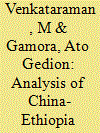

|
|
|
|
|
| Publication |
2009.
|
| Summary/Abstract |
This article analyses the bilateral relations between China and Ethiopia during the Cold War period and brings out the interplay of domestic, regional and extra-regional factors that went into the shaping of bilateral relations. China's growing involvement and various attempts at consolidation of political and economic relationship with African countries-a relatively recent phenomenon-is perceived as a result of the dynamic interplay of economic and political factors. As with other African countries, China's interaction with Ethiopia in the post-Cold War period is markedly different from pre-1990 years. This article investigates the political/economic factors underlying this shift. It describes and analyses the factors that led to China's political and economic ties with Ethiopia (and Africa) during the years of Mao and Deng Xiaoping. It concludes that motivated by the desire to realise its priorities and goals, China's venture into Africa and Ethiopia was shaped by the shift in relations between the United States (US) and China and the Cold War dynamics in the Horn that prevented any kind of consolidation of relations with Ethiopia on the one hand and regime change in Ethiopia on the other.
|
|
|
|
|
|
|
|
|
|
|
|
|
|
|
|
| 2 |
ID:
122609
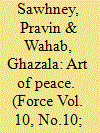

|
|
|
| 3 |
ID:
148764
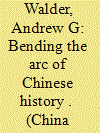

|
|
|
|
|
| Summary/Abstract |
Contrary to its initiators’ intentions, the Cultural Revolution laid political foundations for a transition to a market-oriented economy whilst also creating circumstances that helped to ensure the cohesion and survival of China's Soviet-style party-state. The Cultural Revolution left the Chinese Communist Party and civilian state structures weak and in flux, and drastically weakened entrenched bureaucratic interests that might have blocked market reform. The weakening of central government structures created a decentralized planned economy, the regional and local leaders of which were receptive to initial market-oriented opportunities. The economic and technological backwardness fostered by the Cultural Revolution left little support for maintaining the status quo. Mao put Deng Xiaoping in charge of rebuilding the Party and economy briefly in the mid-1970s before purging him a second time, inadvertently making him the standard-bearer for post-Mao rebuilding and recovery. Mutual animosities with the Soviet Union provoked by Maoist polemics led to a surprising strategic turn to the United States and other Western countries in the early 1970s. The resulting economic and political ties subsequently advanced the agenda of reform and opening. China's first post-Mao decade was therefore one of rebuilding and renewal under a pre-eminent leader who was able to overcome opposition to a new course. The impact of this legacy becomes especially clear when contrasted with the Soviet Union in the 1980s, where political circumstances were starkly different, and where Gorbachev's attempts to implement similar changes in the face of entrenched bureaucratic opposition led to the collapse and dismemberment of the Soviet state.
|
|
|
|
|
|
|
|
|
|
|
|
|
|
|
|
| 4 |
ID:
119715
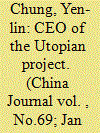

|
|
|
| 5 |
ID:
120517
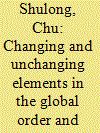

|
|
|
| 6 |
ID:
130716
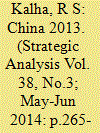

|
|
|
|
|
| Publication |
2014.
|
| Summary/Abstract |
It is a matter of widespread belief that on assumption of supreme power, Chinese leader Xi Jinping's overall ambition was to emerge as an iconic figure in the same league as Mao Zedong and Deng Xiaoping. At the very outset, Xi realised this would necessitate the elimination of any political challenge and his first step was therefore to consolidate an unassailable position within the Standing Committee of the Party Politburo (PBSC). To achieve this objective, Xi chose to emulate some of the policies and methods of the late Mao Zedong, albeit with modern underpinnings.
|
|
|
|
|
|
|
|
|
|
|
|
|
|
|
|
| 7 |
ID:
049635
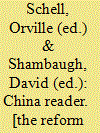

|
|
|
|
|
| Publication |
New York, Vintage books, 1999.
|
| Description |
xx, 553p.pbk
|
| Standard Number |
0679763872
|
|
|
|
|
|
|
|
|
|
|
|
Copies: C:1/I:0,R:0,Q:0
Circulation
| Accession# | Call# | Current Location | Status | Policy | Location |
| 043332 | 951.058/SCH 043332 | Main | On Shelf | General | |
|
|
|
|
| 8 |
ID:
053970
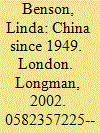

|
|
|
|
|
| Publication |
London, Longman, 2002.
|
| Description |
xviii, 152p.pbk
|
| Series |
Seminar Studies in History
|
| Standard Number |
0582357225
|
|
|
|
|
|
|
|
|
|
|
|
Copies: C:1/I:0,R:0,Q:0
Circulation
| Accession# | Call# | Current Location | Status | Policy | Location |
| 046293 | 951.05/BEN 046293 | Main | On Shelf | General | |
|
|
|
|
| 9 |
ID:
115612
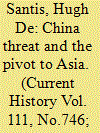

|
|
|
|
|
| Publication |
2012.
|
| Summary/Abstract |
America's expanding military footprint in Asia may be more of a provocation than a deterrent to China's aggressive behavior.
|
|
|
|
|
|
|
|
|
|
|
|
|
|
|
|
| 10 |
ID:
122320
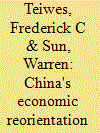

|
|
|
|
|
| Publication |
2013.
|
| Summary/Abstract |
Although the broad outlines of the conflicting views and interests concerning economic readjustment following the December 1978 Third Plenum are adequately understood in the existing literature, academic accounts and the official narrative seriously misunderstand or misrepresent the élite politics surrounding the readjustment program in 1979-80. The view that Deng Xiaoping and Chen Yun joined forces in an alliance against Hua Guofeng has merit, but not, as commonly claimed, as a rejection of Hua's failed economic policies-Deng in fact was the most forceful advocate of the pre-plenum policies which Chen found most detrimental. The second widely accepted proposition, that Deng and Chen subsequently fell out along reform vs. readjustment lines, with Chen gaining the upper hand by late 1980, also distorts political reality. When readjustment finally achieved its most forceful manifestation, the actual policies were formulated by Zhao Ziyang, with Deng's crucial backing.
|
|
|
|
|
|
|
|
|
|
|
|
|
|
|
|
| 11 |
ID:
115194
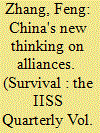

|
|
|
|
|
| Publication |
2012.
|
| Summary/Abstract |
In December 1949, Mao Zedong, paramount leader of the newly founded People's Republic of China, travelled to Moscow to negotiate a military alliance with the Soviet Union. Within barely two decades, however, not only had the alliance collapsed, but the two former allies had become bitter ideological and military adversaries. Strategic exigencies compelled the Chinese leadership to seek rapprochement with the United States, producing a quasi-alliance between the two erstwhile enemies after 1972. In January 1979, during his visit to Washington, Deng Xiaoping sought to nudge the United States toward developing a de facto, if informal, alliance with China in order to secure American support for China's impending invasion of Vietnam. During the last decade of the Cold War, China and the United States also maintained a degree of strategic cooperation against the Soviet Union.
|
|
|
|
|
|
|
|
|
|
|
|
|
|
|
|
| 12 |
ID:
187364
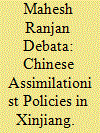

|
|
|
|
|
| Summary/Abstract |
This research article argues that the China’s intention and contention to maintain stronghold in Xinjiang through different policies from time to time reflects the views of Realist theory of international relations, which gives primacy to ‘national interest’ and ‘national security.’ Furthermore, the article argues that the Chinese emphasis on national security and stability in Xinjiang negates the ‘interests and aspirations’ of minority groups in Xinjiang (especially Uyghurs), which form the basis of constructive approach of international relations. While elaborating Chinese policies of assimilation of Uyghurs in Xinjiang from Mao Zedong to Xi Jinping, this article tries to examine how China’s bid to pursuing a kind of hardcore realism in preserving and protecting its interests in Xinjiang (stringent policies) has been contradicting and disregarding the essence of constructivist perspective (aims, and aspirations interests of Uyghurs).
|
|
|
|
|
|
|
|
|
|
|
|
|
|
|
|
| 13 |
ID:
126366
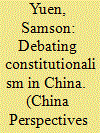

|
|
|
| 14 |
ID:
122610
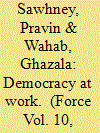

|
|
|
| 15 |
ID:
149179
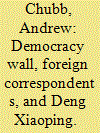

|
|
|
|
|
| Summary/Abstract |
This article identifies and explains the role of the Western media in Chinese politics between November 1978 and April 1979, when the rise of Deng Xiaoping within the Communist Party coincided with the emergence of the Democracy Wall free speech movement on China’s streets, and the normalization of Sino-American relations. At this critical juncture in twentieth-century history, foreign journalists in Beijing were much more than simply gatekeepers of a conduit to the outside world. Chinese activists believed that, through the Western media, they could reach domestic audiences in China, and potentially even the Party leadership. Indeed, foreign reporting contributed to the movement’s spread to issue_image_89_3_Foreign Correspondents China - EA Photo2other parts of the country, while strengthening and accentuating its most radical aspects. However, the main beneficiary of these interactions was Deng, who enlisted Democracy Wall and the foreign media, at times in conjunction, to advance his domestic and international objectives. Once he had secured control of the Party’s political direction, and the normalization of Sino-American relations, the foreign press provided the rationale, if not the impetus, for the movement’s suppression. Drawing on participant interviews, new Chinese sources, and analysis of press archives, this article brings important new insights into the momentous political events that set in motion the ongoing transformation of China and the region. It also illuminates the little-studied role of international media in producing “radical flank effects” that can help or hinder both social movements and state authorities. The case stands as a cautionary example for social activists attempting to harness the power of international media today.
|
|
|
|
|
|
|
|
|
|
|
|
|
|
|
|
| 16 |
ID:
059254
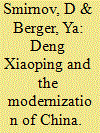

|
|
|
|
|
| Publication |
Oct-Dec 2004.
|
|
|
|
|
|
|
|
|
|
|
|
|
|
|
|
| 17 |
ID:
110057
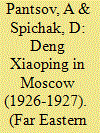

|
|
|
|
|
| Publication |
2011.
|
| Summary/Abstract |
The article dwells in detail on the study period of the future great reformer of China Deng Xiaoping and his fellow students in Moscow in 1926-1927 and is based on the now available documents from the Russian State Archives of Socio-Political History (RSASPH). It analyzes the questions involved in the ideological, theoretical and party-political training of Deng Xiaoping at one of the leading Comintern study centers - Sun Yat-sen Communist University of the Toilers of China. The authors come to the conclusion that everything achieved by Deng during his studies had a decisive influence on the formation of his Marxist views. And the fact that "socialism with Chinese characteristics," which emerged in China, resembles in many respects the Soviet New Economic Policy (NEP) was largely due to the education received by Deng in the Soviet Union.
|
|
|
|
|
|
|
|
|
|
|
|
|
|
|
|
| 18 |
ID:
128503
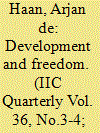

|
|
|
| 19 |
ID:
137523
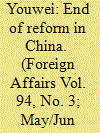

|
|
|
|
|
| Summary/Abstract |
Since the start of its post-Mao reforms in the late 1970s, the communist regime in China has repeatedly defied predictions of its impending demise. The key to its success lies in what one might call “authoritarian adaptation”—the use of policy reforms to substitute for fundamental institutional change. Under Deng Xiaoping, this meant reforming agriculture and unleashing entrepreneurship. Under Jiang Zemin, it meant officially enshrining a market economy, reforming state-wned enterprises, and joining the World Trade Organization. Under Hu Jintao and Wen Jiabao, it meant reforming social security. Many expect yet another round of sweeping reforms under Xi Jinping—but they may be disappointed.
|
|
|
|
|
|
|
|
|
|
|
|
|
|
|
|
| 20 |
ID:
112818


|
|
|
|
|
| Publication |
2012.
|
| Summary/Abstract |
THE YEAR 2011 will be remembered as a period of unprecedented uncertainty in the history of modern Europe. On the one hand, contrary to widespread apocalyptic expectations, the EU did not crumble and the amplitude of the oscillations in the value of the relatively young European currency did stay within tolerable limits. On the other, it is clear that the integrated Europe's worst crash tests are still ahead and that the difficulties confronting the EU are a lot more systemic than circumstantial ...
|
|
|
|
|
|
|
|
|
|
|
|
|
|
|
|
|
|
|
|
|